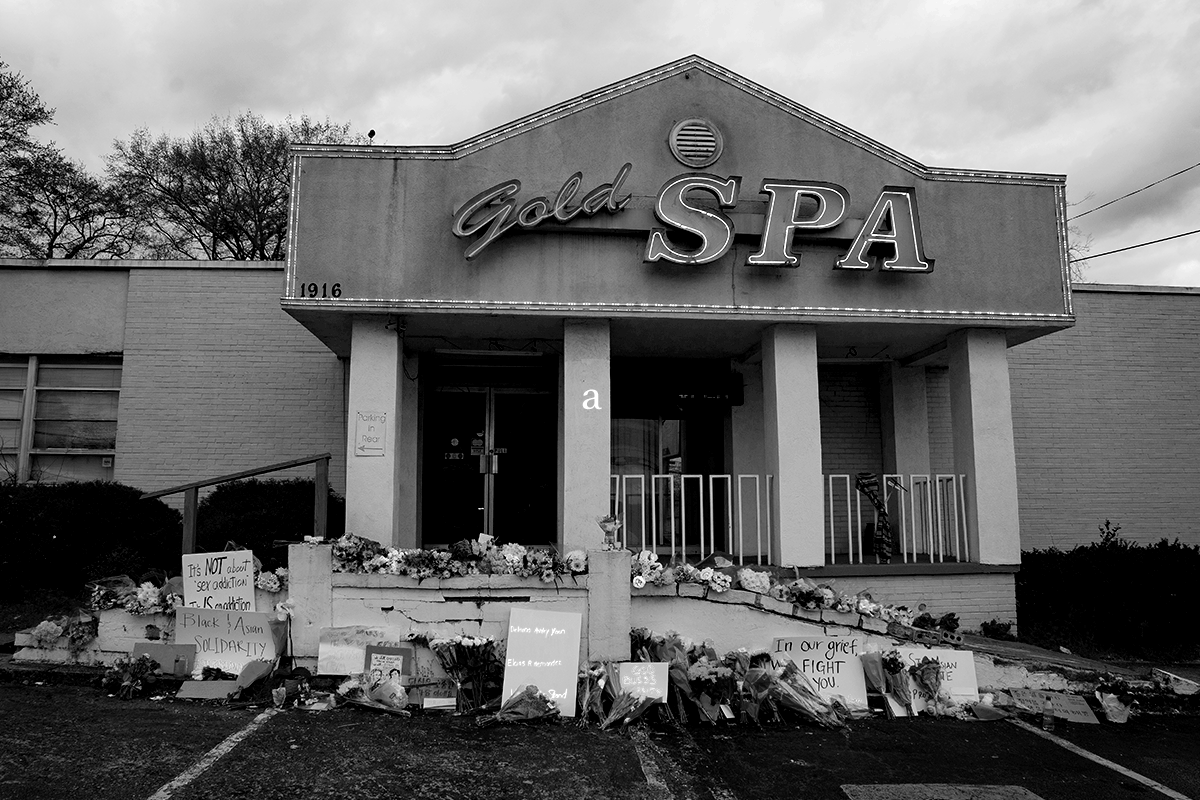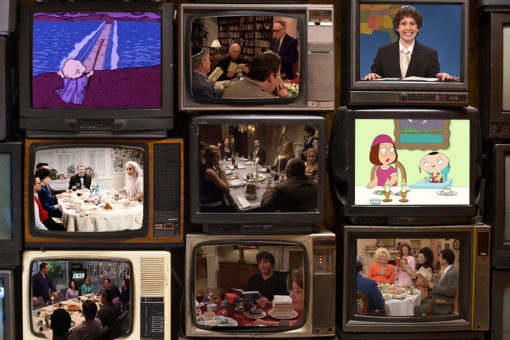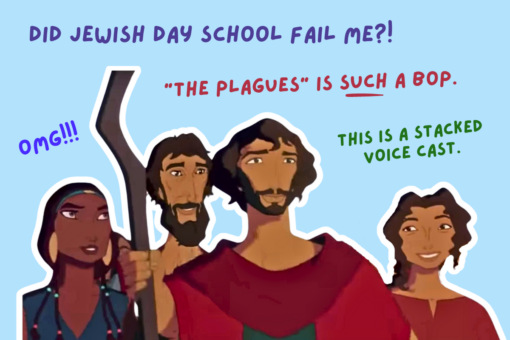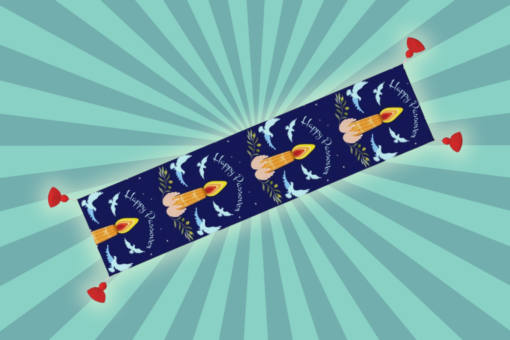In this Alma roundtable, six Asian Jews sat down to share their experiences and discuss rising anti-Asian violence. They also spoke about longer-standing issues: the need for Asian representation in Jewish spaces, the centering of white Ashkenazi Judaism, and the struggle to have all of one’s identities acknowledged — along with the hope and support provided by the larger community of Jews of color.
Initially, this conversation was planned to take place before the horrific murders in Atlanta, Georgia. It ended up taking place just after the attacks, and while the conversation still touched on all of the aforementioned topics, it also naturally focused on the attacks, and on their aftermath.
The participants:
Gen Xia Ye Slosberg (she/her) is the Co-Creator & Producer of LUNAR: The Jewish-Asian Film Project and the Program Manager of Jewish Youth for Community Action. She is passionate about building power and advancing equity and visibility for mixed-race folks and Jews of Color. (Instagram: @asian.jews)
Hanah Bloom (she/her) is an honors first year student majoring in political science and philosophy at Miami University of Ohio. She’s on the pre-law track and loves green tea, cute dogs, and southern fried chicken. Hanah is a 2020-2021 Alma College Writing Fellow. (Instagram: @hanah.bloom)
Lee Harris (he/him) is a Filipino/Italian-American Jew who lives in the deep south. He is a stay at home homeschool parent who spends his free time doing social media work for his local PJ Library, exploring the outdoors, and cooking all the things. (Instagram: @the.harris.house)
Lishai Peel (she/her) is a writer and educator based in Toronto. Her work has appeared in literary journals in Canada, the U.S., and the U.K. She is an MFA Creative Writing Candidate and her second book of poetry is forthcoming with Write Bloody North Publishing. (@lishaip on Instagram and Twitter)
Rachel Shabtai (she/her) was born and raised in San Francisco, CA to a Chinese-Vietnamese mother who converted to Judaism and an Israeli father. She currently resides in Brooklyn, NY and frequents Canal Street for dim sum.
Maya Siegel (she/her) is a 20-year-old student and advocate. She is passionate about youth empowerment, environmental justice, and community service. (Instagram: @maya.siegel)
This conversation has been lightly edited for clarity.
Gen: First off, how would you describe your racial, ethnic, and cultural identities?
Jasmine: I’m Jewish, and half Persian, half Chinese!
Gen: I usually describe myself as mixed-race, Chinese, Ashkenazi Jewish and white.
Maya: Jewish and Chinese 🙂
Lishai: I also usually describe myself as mixed-race. Ashkenazi from my dad’s side of the family. Bene Israel Indian Jewish from my mother’s side.
Rachel: I’m Jewish and half Israeli, half Chinese-Vietnamese
Hanah: I’m a mixed-race American! Ethnically, half Japanese and half Ashkenazi Jewish.
Gen: How are you doing, with last week’s events? What feelings are coming up?
I can start us off by saying I’m feeling so many things at the same time…. I’m angry that East Asian women are being treated as disposable sexual objects, and that’s brought up a lot for me in terms of my past experiences with being sexualized, especially by white men. This being said, as someone who’s not frequently read as “Asian,” who is sometimes white-presenting, I have a lot of privilege in this area and my physical safety isn’t often threatened by anti-Asian sentiments. So I’m really grappling with what place I have in this as a leader, and as someone who is pretty vocal about Jewish Asian voices.
Hanah: Exhaustion. A lot of my mental energy was drained last week. Luckily, I have the privilege to lean on a community through this time. Frustration still looms. For the past several months, anti-Asian hate has been a source of anxiety. For the past several weeks, I’ve been reaching out to my campus community members, looking for more resources for AAPI students. More resources finally came to light along with statements of support, but I’m disappointed that it took a mass shooting.
Lee: I’m angry. I go through waves. Anger, sadness, more anger, and then frustration. As someone who is half Asian but presents white, I don’t fear for my safety. I also feel like because I am seen as “not that Asian,” I am hearing conversations that would not be said the same way in more East Asian presences. I’m disappointed mostly from many sides.
Rachel: It’s a mixed bag because racism against Asians has been going on for so long, but only after this year has it gotten significantly worse. Last week’s events remind me of the straw that broke the camel’s back when the George Floyd protests started (but for Asians). I’ve definitely had a lot of conversations with my cousin, who is Chinese, and it’s been really difficult for us to process our emotions with all of this.
Gen, I totally get where you’re coming from as not being read as “Asian” and can be white-presenting. Because of this, I also have a lot of privilege because of the way I look. Sometimes I feel like I have imposter syndrome.
Jasmine: I feel you guys completely. I feel hurt, but am also aware that I am not experiencing racism as directly as others may be. One of my friends asked me the other day, “So what’s going on in the Asian community?” (As if this were an “Asian” issue.) I patiently told him that although I don’t directly experience racism, it affects me deeply because I’ve seen how my mom and grandmother could be (and have been) affected by this kind of ignorance and hatred. It makes things a lot more personal.
Lishai: Well, as a Canadian, I am thinking, “How many more have to die before gun reform in the States becomes a concrete possibility?” These mass shootings are just horrific. I’m thinking about how disposable and sexualized/racialized woman are in the context of white supremacy. I’m thinking about the inequities of migrant workers, sex workers, and how women remain unprotected by the countries that use them.
Gen: Totally. I think by only talking about this as an anti-Asian hate crime, we miss a lot of nuance. Many of these women were working-class migrants. They worked in the service industry where their pay often depends on customer tips, and they have relatively little economic or political power, in relation to their employers but also larger society. I feel like by generalizing their experience as one that any Asian could have is not really useful.
Lishai: Yeah, it really highlights the fuckery of a society that is dependent sex labor and sex work but does not protect those in it.
Gen: I went to massage parlors with my mom growing up, and a lot are just massage businesses. So to even generalize these women as sex workers makes me a bit confused, to be honest.
Maya: I’m disappointed to see so many centering their guilt instead of the victims’ stories.
Gen: I echo that disappointment, honestly. I work in the Jewish communal field. I have had many colleagues reach out and ask me how I am doing, which I really appreciate. This being said, I’ve also seen organizations post pretty performative statements, when I KNOW they don’t have a single Jew of Color on staff or in their network and community. What do you mean, “Asian Jews, we see you”? Do you truly see us if you aren’t committing yourself to the anti-racist work of hiring more diverse staff and building an organizational culture that supports us?
Lee: I called out my local Jewish community and did not get the responses I hoped for. The majority is arguing that “all violence is wrong” and “whatever his true motive was, we stand for the Asian community.” I don’t know if they understand that they’re invalidating a lot of Asians’ grief process. But again, disappointed.
Maya: A lot of actions on social media are performative. Tagging Asians and buying from an Asian-owned business isn’t “doing your part” or honoring the lives lost. They are part of the problem, not the solution.
Gen: Right. I’ve seen a few Asian Jewish colleagues calling out white people who are tagging them as “people to follow” but aren’t actually invested in building relationships.
Hanah: I appreciate the widespread and immediate condemnation of hate. But, more could be done. A quick condemnation should be followed by action. Donating to the Asian American mutual aid groups, migrant worker advocacy groups, and educating yourself on policies directly affecting the AAPI community are more meaningful to me than offers of condolences and prayers.
I also want to caution white Jewish communities against overloading Asian Americans that don’t initiate these conversations with you. Right now, I feel as though AAPI community members are feeling the extra burden of having to educate others, re-opening the wounds of racial trauma. Navigate with extra sensitivity.
As we observe Passover soon, we should really take our lessons on slavery, oppression, and liberation to heart. Then, for our Jews of color, we should put them to practice.
Lee: It’s really weird to see people I know stand for me — “We support you as a Jew” or “We support you as a trans man” — but when it comes to my Asian identity, they have me feeling that same imposter syndrome I struggled with the majority of my life.
Lishai: I hear you all. A lot of performative gestures going on via social media. I’m wondering how the Jewish community is responding. Gen, you seem to have a good ear to the ground with the U.S. Jewish community. Is this being taken up? I often feel like there is an attitude within the Jewish community that “it’s not a Jewish problem,” but this approach is problematic on several points, one of which is that often excludes folks from within the Jewish community who are not Ashkenazi.
Gen: I am pretty involved with the Jewish social justice space professionally. I have seen most orgs make some form of statement. Not all have included action items. Some have a topical mention of Asian Jews, like “we see you,” “we are hurt by this deep tragedy which also affects our Asian Jewish community.”
And +1 to what you said. When they say “it’s not a Jewish problem,” I hear: It’s not a white Ashkenazi problem.
Lishai: Exactly.
Gen: It re-centers whiteness and sets the norm of Jewishness, and what issues we as Jews should be concerned about, to whatever concerns white Ashkenazi Jews.
I think the Black Lives Matter movement last summer was the first time so many Jewish groups started to seriously reckon with racial justice. So I’m surprised more groups aren’t really showing up in any meaningful way. Like I wonder how many of those orgs making statements actually reached out to the Asian Jews in their network.
Maya: I wonder how many don’t know any Asian Jews.
Gen: RIGHT! And aren’t investing in building relationships with us.
Lee: I’ve heard so many people say that they’re just now aware of how many Asian Jews exist thanks to the Lunar Project.
Lishai: I honestly think part of the problem is just not being seen and/or validated in a meaningful way as part of the larger Jewish community.
Gen: Yup! Like I often tell white people, yes, work on your diversity initiatives and make white Jews do the work so they don’t say problematic shit. This being said, even if no one says anything problematic to me ever (which is not true, I’ve definitely heard lots of shit), as long as there aren’t Asian Jewish role models, Asian Jewish media content, Asian Jewish leaders and mentors… I still wouldn’t feel like I belonged.
Maya: I feel like neither of my identities are really validated in schools, especially before coming to college, just because education isn’t taught about either culture.
Gen: On top of generally being little to no representation of Jewish or Asian identity, even within these groups, representation is so fraught. Like when the general public think about Jews or Asians, they think about white rich people and light-skinned affluent East Asians, respectively, which is reflective of both antisemitism and the model minority myth.
Rachel: YES. It’s so problematic on so many different levels.
Maya: To Lishai’s point, I get a lot of comments about “never having met someone that is Jewish and Asian” and questions about how that’s possible. The questions are out of curiosity, but definitely make me uncomfortable. I often feel like I’m not Asian or Jewish “enough” because of all the questions.
Lishai: Yes, I really hear you all on this one. I often feel that my identity as an Indian Jew is completely invisible to those who are outside of my community and those who do know about us make assumptions that are insulting to my ancestry and my Jewish roots or exotify the Indian Jewish experience.
Gen: Yeah, my friends who are Mizrahi or Bene Israel Jews have said similar things around people having really negative ideas about Jews from non-European countries. Even after meeting so many Asian Jews through LUNAR, and knowing there’s a whole bunch of us, those “I’ve never met an Asian Jew” comments still get me.
Hanah: Being a half-Japanese woman who’s also Ashkenazi Jewish, I’ve always felt as if my identity is positioned in some sort of weird limbo — for most people, too difficult or burdensome to categorize. Race-wise, I thought I was pretty white-passing. After recently starting to attend a PWI [predominantly white instituion], I quickly found out that I wasn’t. It emboldened me to be more vocal about my community.
Gen: Last question — what’s giving you hope right now? (If anything…)
Rachel: It’s so much easier to hone in on all the negativity, including just daily racism and attacks, that people easily forget that there are still good people out there who are stepping up to help. For example, this older woman in NYC who was being attacked on her way to a protest — it sucks that she was shoved, BUT many people helped her. It’s the little things I’m holding onto now.
I think as Asian Jews we are also in really vulnerable positions to project our anger towards other people. My cousin literally did that to me earlier because she’s been emotional and doesn’t know where to direct her anger.
Lee: I saw a clip of an Asian and Black voices solidarity march; it gave me some hope. Seeing solidarity inside the BIPOC community, especially the JOC [Jews of Color] community, makes me feel heard and included.
Lishai: Being in JOC spaces, and feeling heard and seen. I’m also hopeful about the conversations about race that are happening within the Jewish community.
Gen: Fellow JOC folks were some of the first to reach out to me. Really appreciated the leadership of JOC advocacy groups like Be’chol Lashon and Jews in All Hues reaching out to LUNAR.
Maya: I always find joy and hope when I am in community with other Asian women. Their strength inspires me.
Rachel: I love going to Chinatown as often as I can just to go and talk to people there!
Gen: I was in San Francisco Chinatown on Saturday for a community event. It was super great to even just walk along the streets, look at the art, and see all these businesses in historical buildings thriving and bustling with people.
Hanah: The youth give me hope. I think within the community, AAPI discourse is finally giving attention to abolitionist and anti-imperialist ideas. We’re finally identifying the root issues and broken institutions actively marginalizing and murdering communities of color. The next steps involve action! My fellow college student activists indicate that they’ll be there in the fight.
Rachel: This might sound strange because I don’t know you all that well, but thank you for your strength and for sharing your experiences! Conversations like this aren’t always easy, but I’m so glad that we can have a space like this to have productive discussions where we aren’t judged.



